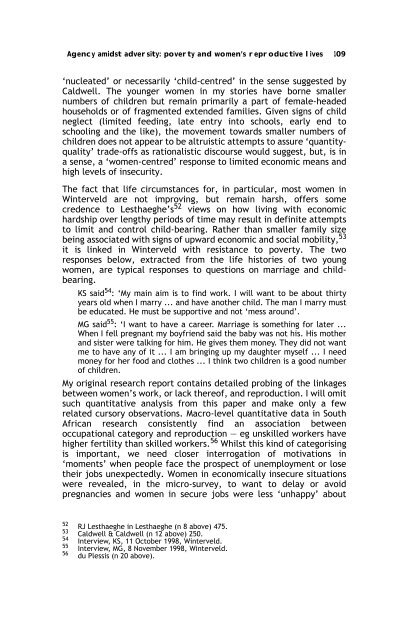Sex, Gender, Becoming - PULP
Sex, Gender, Becoming - PULP
Sex, Gender, Becoming - PULP
You also want an ePaper? Increase the reach of your titles
YUMPU automatically turns print PDFs into web optimized ePapers that Google loves.
Agency amidst adversity: poverty and women’s reproductive lives 109<br />
‘nucleated’ or necessarily ‘child-centred’ in the sense suggested by<br />
Caldwell. The younger women in my stories have borne smaller<br />
numbers of children but remain primarily a part of female-headed<br />
households or of fragmented extended families. Given signs of child<br />
neglect (limited feeding, late entry into schools, early end to<br />
schooling and the like), the movement towards smaller numbers of<br />
children does not appear to be altruistic attempts to assure ‘quantityquality’<br />
trade-offs as rationalistic discourse would suggest, but, is in<br />
a sense, a ‘women-centred’ response to limited economic means and<br />
high levels of insecurity.<br />
The fact that life circumstances for, in particular, most women in<br />
Winterveld are not improving, but remain harsh, offers some<br />
credence to Lesthaeghe’s 52 views on how living with economic<br />
hardship over lengthy periods of time may result in definite attempts<br />
to limit and control child-bearing. Rather than smaller family size<br />
being associated with signs of upward economic and social mobility, 53<br />
it is linked in Winterveld with resistance to poverty. The two<br />
responses below, extracted from the life histories of two young<br />
women, are typical responses to questions on marriage and childbearing.<br />
KS said 54 : ‘My main aim is to find work. I will want to be about thirty<br />
years old when I marry ... and have another child. The man I marry must<br />
be educated. He must be supportive and not ‘mess around’.<br />
MG said 55 : ‘I want to have a career. Marriage is something for later ...<br />
When I fell pregnant my boyfriend said the baby was not his. His mother<br />
and sister were talking for him. He gives them money. They did not want<br />
me to have any of it ... I am bringing up my daughter myself ... I need<br />
money for her food and clothes ... I think two children is a good number<br />
of children.<br />
My original research report contains detailed probing of the linkages<br />
between women’s work, or lack thereof, and reproduction. I will omit<br />
such quantitative analysis from this paper and make only a few<br />
related cursory observations. Macro-level quantitative data in South<br />
African research consistently find an association between<br />
occupational category and reproduction — eg unskilled workers have<br />
higher fertility than skilled workers. 56 Whilst this kind of categorising<br />
is important, we need closer interrogation of motivations in<br />
‘moments’ when people face the prospect of unemployment or lose<br />
their jobs unexpectedly. Women in economically insecure situations<br />
were revealed, in the micro-survey, to want to delay or avoid<br />
pregnancies and women in secure jobs were less ‘unhappy’ about<br />
52<br />
RJ Lesthaeghe in Lesthaeghe (n 8 above) 475.<br />
53 Caldwell & Caldwell (n 12 above) 250.<br />
54 Interview, KS, 11 October 1998, Winterveld.<br />
55<br />
Interview, MG, 8 November 1998, Winterveld.<br />
56 du Plessis (n 20 above).
















